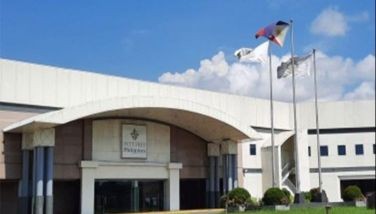Don’t talk of love or progress, show me!

December 12, 2001 | 12:00am
All through the speeches that morning, I kept hearing that song in My Fair Lady, a Broadway hit of long ago. The exasperated Eliza Doolittle responds to a lovesick suitor in a song that goes something like this… "don’t talk of stars, don’t talk of love, don’t talk at all… show me!"
Eventually, the hot air from the so-called Economic Summit brought rains down on the metropolis last Monday afternoon. It was all Mother Nature could take. The proceedings inside the conference hall were so boring that ANC 21 made the right decision to focus on the more interesting panel discussions they had in the studio.
I listened intently to the speech of President GMA and, I must confess, she said all the right things again, like in the SONA some six months or so ago. Her speech was, in fact, a mini version of the SONA, reiterating the same promises but little by way of a progress report on how well she has done in realizing her SONA promises.
But politicians and their spinmasters know that Filipinos have short attention spans so it is easy to gloss over progress towards the fulfillment of promises. Also, this media driven society works on the basis of the story for the day. It is easy to make nice words in a well-crafted and delivered speech, seem like concrete action or accomplishment.
As for that exercise last Monday, it really reminds me of that song. Don’t talk of making Filipino farmers competitive, show them. Don’t talk of cheap housing for the homeless, show them. Don’t talk of making Mindanao agri-produce cheaper in Manila than imports by reforming the shipping industry, show us. As for
making prescription drugs affordable, what has been done is nothing more than token, too little to really matter.
Impatient, we all are. And we have every right to be. I guess President GMA is right when she said that the secret of the summit is in the preparatory talks and the follow through. Here’s hoping the follow though will see these promises realized finally.
An NGO based in Los Baños called Farmer Scientist Partnership for Development (MASIPAG) sent me an e-mail over the weekend that discussed a report of the Department of Agriculture that dealt with the impact of our WTO membership on our agricultural sector. It supposedly concluded that after seven years of WTO membership Philippine agriculture is still sluggish and "remains a center of poverty and stagnant productivity."
Masipag is apparently referring to the country position paper read at the Doha meeting. Interestingly, the paper supposedly pointed to "inadequacy of government support, tardiness and lowering tariffs beyond WTO bound commitments have caused the sector’s failure to modernize, diversify and take advantage of existing market access opportunities."
This is alarming, specially now that the "synchronized recession" made possible by globalization, has made agriculture the anchor sector of the economy. But how can this sector help us weather the economic storm in its weakened condition? As the DA itself pointed out, "75 percent of farmers and fisherfolk remains in poverty and output growth is less than two percent since the 1990s."
The DA admitted that since the country started implementing the agreements on agriculture in 1995, there has been a "virtual non-existence of the domestic support structure." It said government is culpable of "six years tardiness" in enacting necessary trade remedy laws on anti-dumping and other special safeguard measures.
Of the promised P128-billion fund on physical safety nets for infrastructure and competitiveness enhancing public investments, only 40 percent was complied by the government. An average domestic support of only four percent of Gross Value Added was implemented out of the WTO allowable 10 percent, the DA said. Some developing countries "now deemed successful in adjusting to globalization" have laid down increased domestic support structure to allowable limits, said the DA.
The agriculture department noted the Philippines registered almost full compliance to commitments to the 142 member-country WTO. But it has often been pointed out that it has been to the country’s detriment.
Quantitative Restrictions (QR), a quota set on imports have been slashed on corn, coffee, garlic, potato, cabbage, onion and livestock. "It’s like a death sentence for farmers involved in producing these agricultural products," said Leopoldo Guilaran of the organic farming network Farmer Scientist Partnership for Development.
Cheap onion from China, US, Netherlands, India and Australia swarm the local market slowly killing the once vibrant industry of Central Luzon where about 90,000 local populace earn a living. Corn farmers cannot compete with imports from countries like China, Indonesia, Brazil, India and Thailand. Market price of local corn is at P4 to P4.50 per kilo as against the P3.50 imported grain. From 1993 to 1998, corn import rose by more than 600 times from 640 metric tons to 426,000 metric tons. Recently, government announced plans to import 230,000 metric tons.
In rice, considered a political commodity in rice-eating countries like the Philippines, a QR is maintained. Minimum requirement on rice import is set at one percent of total consumption but has to be increased to three percent until year 2004. Last year, the country shipped in 660,000 metric tons, 10 times bigger than 1994 volume. In 1999, it imported 800,000 metric tons, which resulted to oversupply and led to a sharp decline of farm gate prices of locally-produced palay, according to Ibon Databank.
Masipag estimates that "already, an estimated 700,000 Filipinos have been displaced by the global trading scheme since 1995." In contrast, the Organization for Economic Cooperation and Development, where the US and EU are leading members, "currently spends an estimated US$1 billion per day in agricultural support and continue to pollute the international trading environment with distortions," said the DA. Don’t blame the rich countries for knowing how to support their farmers. Our problem is, we don’t.
Well, if the DA feels this strongly about what went wrong in our approach to our WTO commitments as they impact on agriculture, maybe we are about to see some welcome reforms. Why were our negotiators, specially during the Ramos era, too ready to sacrifice our farmers to impress the WTO? Now we know better, or do we?
In this season of giving, reader Chito Santos reminds us that "Love is an ocean of emotions entirely surrounded by expenses."
(Boo Chanco’s e-mail address is [email protected])
Eventually, the hot air from the so-called Economic Summit brought rains down on the metropolis last Monday afternoon. It was all Mother Nature could take. The proceedings inside the conference hall were so boring that ANC 21 made the right decision to focus on the more interesting panel discussions they had in the studio.
I listened intently to the speech of President GMA and, I must confess, she said all the right things again, like in the SONA some six months or so ago. Her speech was, in fact, a mini version of the SONA, reiterating the same promises but little by way of a progress report on how well she has done in realizing her SONA promises.
But politicians and their spinmasters know that Filipinos have short attention spans so it is easy to gloss over progress towards the fulfillment of promises. Also, this media driven society works on the basis of the story for the day. It is easy to make nice words in a well-crafted and delivered speech, seem like concrete action or accomplishment.
As for that exercise last Monday, it really reminds me of that song. Don’t talk of making Filipino farmers competitive, show them. Don’t talk of cheap housing for the homeless, show them. Don’t talk of making Mindanao agri-produce cheaper in Manila than imports by reforming the shipping industry, show us. As for
making prescription drugs affordable, what has been done is nothing more than token, too little to really matter.
Impatient, we all are. And we have every right to be. I guess President GMA is right when she said that the secret of the summit is in the preparatory talks and the follow through. Here’s hoping the follow though will see these promises realized finally.
Masipag is apparently referring to the country position paper read at the Doha meeting. Interestingly, the paper supposedly pointed to "inadequacy of government support, tardiness and lowering tariffs beyond WTO bound commitments have caused the sector’s failure to modernize, diversify and take advantage of existing market access opportunities."
This is alarming, specially now that the "synchronized recession" made possible by globalization, has made agriculture the anchor sector of the economy. But how can this sector help us weather the economic storm in its weakened condition? As the DA itself pointed out, "75 percent of farmers and fisherfolk remains in poverty and output growth is less than two percent since the 1990s."
The DA admitted that since the country started implementing the agreements on agriculture in 1995, there has been a "virtual non-existence of the domestic support structure." It said government is culpable of "six years tardiness" in enacting necessary trade remedy laws on anti-dumping and other special safeguard measures.
Of the promised P128-billion fund on physical safety nets for infrastructure and competitiveness enhancing public investments, only 40 percent was complied by the government. An average domestic support of only four percent of Gross Value Added was implemented out of the WTO allowable 10 percent, the DA said. Some developing countries "now deemed successful in adjusting to globalization" have laid down increased domestic support structure to allowable limits, said the DA.
The agriculture department noted the Philippines registered almost full compliance to commitments to the 142 member-country WTO. But it has often been pointed out that it has been to the country’s detriment.
Quantitative Restrictions (QR), a quota set on imports have been slashed on corn, coffee, garlic, potato, cabbage, onion and livestock. "It’s like a death sentence for farmers involved in producing these agricultural products," said Leopoldo Guilaran of the organic farming network Farmer Scientist Partnership for Development.
Cheap onion from China, US, Netherlands, India and Australia swarm the local market slowly killing the once vibrant industry of Central Luzon where about 90,000 local populace earn a living. Corn farmers cannot compete with imports from countries like China, Indonesia, Brazil, India and Thailand. Market price of local corn is at P4 to P4.50 per kilo as against the P3.50 imported grain. From 1993 to 1998, corn import rose by more than 600 times from 640 metric tons to 426,000 metric tons. Recently, government announced plans to import 230,000 metric tons.
In rice, considered a political commodity in rice-eating countries like the Philippines, a QR is maintained. Minimum requirement on rice import is set at one percent of total consumption but has to be increased to three percent until year 2004. Last year, the country shipped in 660,000 metric tons, 10 times bigger than 1994 volume. In 1999, it imported 800,000 metric tons, which resulted to oversupply and led to a sharp decline of farm gate prices of locally-produced palay, according to Ibon Databank.
Masipag estimates that "already, an estimated 700,000 Filipinos have been displaced by the global trading scheme since 1995." In contrast, the Organization for Economic Cooperation and Development, where the US and EU are leading members, "currently spends an estimated US$1 billion per day in agricultural support and continue to pollute the international trading environment with distortions," said the DA. Don’t blame the rich countries for knowing how to support their farmers. Our problem is, we don’t.
Well, if the DA feels this strongly about what went wrong in our approach to our WTO commitments as they impact on agriculture, maybe we are about to see some welcome reforms. Why were our negotiators, specially during the Ramos era, too ready to sacrifice our farmers to impress the WTO? Now we know better, or do we?
(Boo Chanco’s e-mail address is [email protected])
BrandSpace Articles
<
>
- Latest
- Trending
Trending
Latest
Trending
Latest
Recommended





























